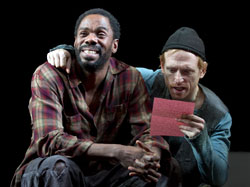Review: Blood Knot

It may be heretical to say, but seeing Athol Fugard’s landmark 1961 drama Blood Knot again, even in a superbly realized revival such as the one being presented by the Signature Theatre, is to be reminded how tedious it is. Such is the case, I’m afraid, with many of the playwright’s works, despite their historical and sociological importance. With one or two exceptions--Master Harold and the Boys being the most notable—Fugard’s dramas tend to be rambling and overly obvious in their themes. In most of them, you can be sure that the title will be dramatically uttered at one point, just to make sure we get the message.
This production--directed by the playwright and serving as the opener in a three-production season devoted to him—is the inaugural offering in the aptly named Alice Griffin Jewel Box Theatre in the company’s handsome new, Frank Gehry-designed theater complex dubbed The Pershing Square Signature Center.
The play concerns the relationship between two biracial South African brothers--one of whom is light enough to pass for white--who live together in a squalid shack on the outskirts of Port Elizabeth, South Africa. Zachariah (Colman Domingo) is a devil-may-care laborer at a whites-only park where his main job is to keep out his fellow blacks. The light-skinned, more ambitious Morris (Scott Shepherd), who has returned to his brother after a long absence, has dreams of saving up enough money to buy a farm for the two of them to run together.
Virtually nothing happens in the lengthy first act of this 2½ hour play, with the brothers engaging in lengthy verbal horseplay, much of it involving Morris’ efforts to procure a female pen pal and eventual love interest for his brother. Unfortunately, she turns out to be white.
Things turn slightly more dramatic in the second half, although the chief conflict revolves around a game of play-acting in which Morris gets all too carried away with his role as a white man and lets loose with a racial epithet that threatens to tear him and his brother apart. It foreshadows the later but similar angry prejudicial exchange that would figure so prominently, and to far greater effect, in Master Harold.
The venue’s intimacy certainly enhances the production’s impact, with the superb, fully lived-in performances by the two actors registering with a visceral intensity. Equally effective is Christopher H. Barreca’s rickety, ramshackle set, which is perched on a platform surrounded by detritus and literally comes apart in the play’s final moments, eerily mirroring the emotional desolation of the characters.
The Fugard season continues with a revival of his 1989 My Children! My Africa! followed by the New York premiere of The Train Driver.
Pershing Square Signature Center, 480 W. 42nd St. 212-244-7529. Through March 11.
| Print article | This entry was posted by Frank on 02/17/12 at 06:18:14 am . Follow any responses to this post through RSS 2.0. |